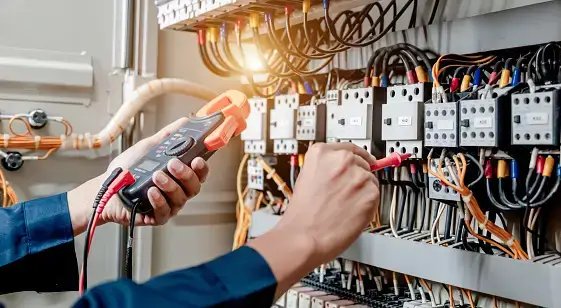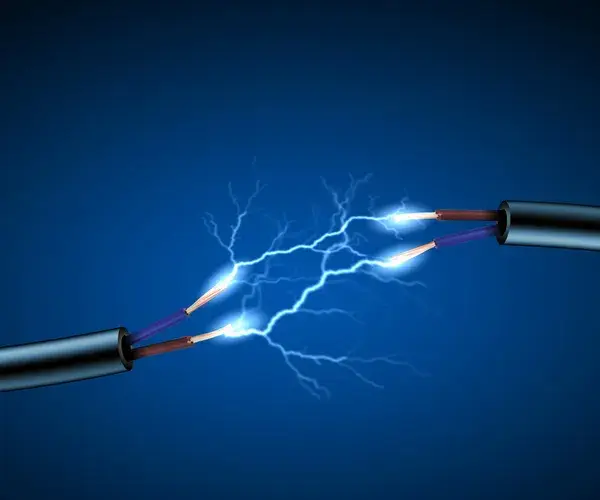We Are One of The Best HVAC Companies
Our experienced team offers services for both residential and commercial properties. With over 10 years of experience in the industry,
Our experienced team offers services for both residential and commercial properties. With over 10 years of experience in the industry,
Working Hours : 24/7


Explore our comprehensive range of services below. If you see something that aligns with your needs, rest assured that our skilled team is ready to assist you. Your satisfaction is our priority, and we are here to provide the expertise you can rely on!
Lighting installation and design
Ceiling fan installation
Electrical repairs and troubleshooting
Circuit breaker upgrades
Outlet and switch installation
Rewiring and electrical system upgrades
Home safety inspections
Panel Box balancing
Electrical system installation and maintenance
Emergency lighting solutions
Circuit design and installation
Commercial lighting retrofits
Data and networking solutions
Electrical safety compliance inspections
High-voltage installations and maintenance
Equipment wiring and assembly
Automation and control systems
Preventive maintenance programs
A short circuit is an electrical phenomenon that occurs when there is an unintended path for current to flow, allowing electricity to bypass the intended circuit components. This typically happens when a connection is made between two points in a circuit that have different voltages, resulting in an excessive current flow.
Short circuits can cause various issues, including:
1. Overheating: The increased current can generate heat, potentially leading to damage to wires and components.
2. Fires: In severe cases, overheating can ignite nearby materials, creating a fire hazard.
3. Equipment Damage: Electrical devices can be damaged due to the sudden surge of current.
4. Circuit Breaker Trips: Many electrical systems have protective devices, like circuit breakers or fuses, that will disconnect the power to prevent damage.
Short circuits often require corrective measures, such as repairing damaged wiring or replacing faulty components, to ensure safe operation.
A circuit breaker trips for a variety of reasons, primarily to prevent overload, short circuits, or ground faults that could cause electrical fires or damage to appliances. Here are some common causes:
1. Overloaded Circuit: This happens when too many devices are plugged into the same circuit. Check if multiple high-wattage appliances are on the same line.
2. Short Circuit: This occurs when a hot wire touches a neutral wire or a grounded part of the system. It often produces a sudden surge in current. Signs can include burnt or melted wires or outlets.
3. Ground Fault: Similar to a short circuit, but involves the hot wire touching a ground wire or a grounded surface. This is common in areas with water, like kitchens and bathrooms.
4. Faulty Appliances: Any appliance that is malfunctioning or has faulty wiring can draw too much current and cause the breaker to trip.
5. Worn Out Breaker: Circuit breakers can wear out over time. If a breaker trips frequently, it may need to be replaced.
6. Older Wiring: If your home has outdated wiring, it may not handle the electrical load, leading to trips.
7. Environmental Factors: Moisture or water intrusion in the electrical panel or outlets can cause shorts and tripping.
To troubleshoot, you can follow these steps:
- Unplug devices on the circuit and reset the breaker.
- Plug appliances back in one by one to identify which one may be causing the trip.
- Inspect outlets and wiring for visible damage.
- If issues persist, consider consulting a licensed electrician for a thorough inspection.
Ensure you handle any electrical fault safely. If you're unsure, it's best to call in professionals.
Flickering lights can be caused by several factors, ranging from minor issues to more serious electrical problems. Here are some common reasons for flickering lights:
1. Loose Bulbs: A bulb that isn’t tightened properly can cause flickering. Check to ensure all bulbs are securely fitted in their sockets.
2. Fluctuating Voltage: If the voltage in your home fluctuates, it can cause lights to flicker. This may happen if you have high-demand appliances that draw heavy current, such as refrigerators or air conditioners.
3. Worn Out Fixtures: Over time, light fixtures and their components can wear out, leading to poor connections and flickering.
4. Faulty Wiring: Loose or frayed wires can cause intermittent connections, which might result in flickering lights. This is a more serious issue that requires professional assessment.
5. Overloaded Circuits: If too many devices are connected to a single circuit, it can cause the circuit to become overloaded, resulting in flickering lights.
6. Dimmer Switch Issues: If you are using a dimmer switch, it may not be compatible with the type of bulbs you are using (especially LED bulbs), leading to flickering.
7. Inconsistent Utility Supply: Issues with the electrical grid or supply from your utility provider can also cause lights to flicker, particularly during peak usage times.
8. Interference from Other Appliances: Certain appliances can cause fluctuations in power that lead to flickering lights when they turn on or off.
If you’re unable to determine the cause of the flickering or if it persists, it's advisable to consult a licensed electrician to ensure safety and proper diagnosis.
